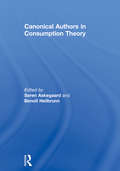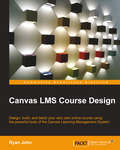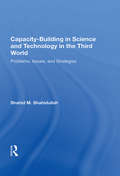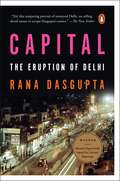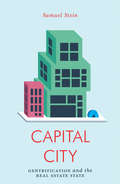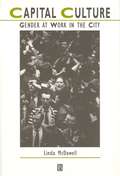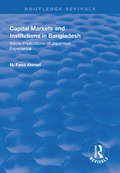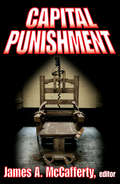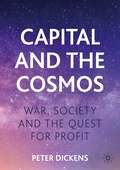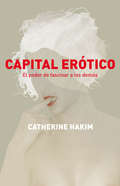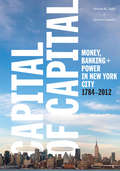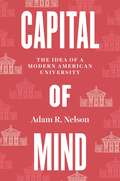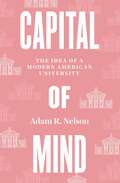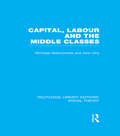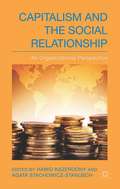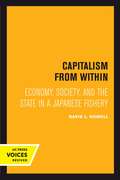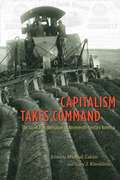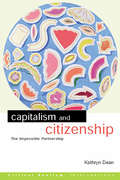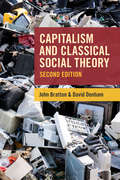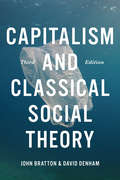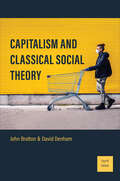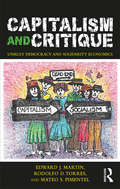- Table View
- List View
Canonical Authors in Consumption Theory
by Benoît Heilbrunn Søren AskegaardCanonical Authors in Consumption Theory is the first work to compile the contributions of the greatest social thinkers in the global conversation about consumption and consumer culture. A prestigious reference work, it offers original chapters by the world's most prominent thought leaders and surveys how the work of historical theorists has influenced and shaped consumption theory, both through history and at the cutting edge of research. Consumption is at the core of contemporary lifestyles, of political successes and failures and of discussions around sustainability and environmental change. Contemporary consumer culture shapes modern identities, and is the engine of the globalizing capitalist economy. Still, most social theorizations over the last century and a half have addressed production processes rather than consumption processes. This is about to change. Studies of consumption play an increasing role as a topic and a domain of study in marketing, anthropology, sociology and cultural studies. Currently, there is no single compilation that systematically links scholarly work published by the greatest social thinkers of the last 150 years to the understanding of contemporary consumer society. This book provides a solid framework for understanding the relevance of these canonical authors in social theory to facilitate analysis of consumer culture, and to act as a comprehensive reference point for consumer researchers, doctoral students and practitioners.
Canvas LMS Course Design
by Ryan JohnThis book is intended for educators who want to use Canvas to enhance their teaching or for educators whose institution has adopted Canvas as its learning management system. Whether you are brand new to online learning or you are a seasoned expert, you will be able to master both the basic functions and the advanced features of Canvas with this book.
Capabilities, Gender, Equality
by Martha C. Nussbaum Flavio ComimQuestions of gender, injustice and equality pervade all our lives, and as such, the capabilities or 'human development' approach to understanding well-being and basic political entitlements continues to be debated. In this thought-provoking book, a range of authors provide unique reflections on the capabilities approach and, specifically, Martha C. Nussbaum's contributions to issues of gender, equality and political liberalism. Moreover, the authors tackle a broad range of development issues, including those of religion, ecological and environmental justice, social justice, child care, disability and poverty. This is the first book to examine Nussbaum's work in political philosophy in such depth, bringing together a group of distinguished experts with diverse disciplinary perspectives. It also features a unique contribution from Nussbaum herself, in which she offers reactions to the discussion and her latest thoughts on the capabilities approach. Capabilities, Gender, Equality will interest a wide range of readers and policy-makers interested in new human development policies.
Capacity-building In Science And Technology In The Third World: Problems, Issues, And Strategies
by Shahid M. ShahidullahTraditional strategies of technical assistance, technology transfer, appropriate technology, and self-reliance for science and technology development in the Third World, cannot be successfully implemented until Third World countries improve their fundamental organization of science and technology. In order to make those improvements - a process kno
Capital
by Rana DasguptaIn Capital, Commonwealth Prize-winning author Rana Dasgupta examines one of the great trends of our time: the expansion of the global elite. Capital is an intimate portrait of the city of Delhi which bears witness to the extraordinary transmogrification of India's capital. But it also offers a glimpse of what capitalism will become in the coming, post-Western world. The story of Delhi is a parable for where we are all headed. The boom following the opening up of India's economy plunged Delhi into a tumult of destruction and creation: slums and markets were ripped down, and shopping malls and apartment blocks erupted from the ruins. Many fortunes were made, and in the glassy stores nestled among the new highways, customers paid for global luxury with bags of cash. But the transformation was stern, abrupt and fantastically unequal, and it gave rise to strange and bewildering feelings. The city brimmed with ambition and rage. Violent crimes stole the headlines. In the style of V. S. Naipaul's now classic personal journeys, Dasgupta shows us this city through the eyes of its people. With the lyricism and empathy of a novelist, Dasgupta takes us through a series of encounters - with billionaires and bureaucrats, drug dealers and metal traders, slum dwellers and psychoanalysts - which plunge us into Delhi's intoxicating, and sometimes terrifying, story of capitalist transformation. Together these people comprise a generation on the cusp, like that of Gilded Age New York: who they are, and what they want, says a tremendous amount about what the world will look like in the rest of the twenty-first century. Interweaving over a century of history with his personal journey, Dasgupta presents us with the first literary portrait of one of the twenty-first century's fastest-growing megalopolises - a dark and uncanny portrait that gives us insights, too, as to the nature of our own - everyone's - shared, global future.
Capital
by Rana DasguptaIn Capital, Commonwealth Prize-winning author Rana Dasgupta examines one of the great trends of our time: the expansion of the global elite. Capital is an intimate portrait of the city of Delhi which bears witness to the extraordinary transmogrification of India's capital. But it also offers a glimpse of what capitalism will become in the coming, post-Western world. The story of Delhi is a parable for where we are all headed. The boom following the opening up of India's economy plunged Delhi into a tumult of destruction and creation: slums and markets were ripped down, and shopping malls and apartment blocks erupted from the ruins. Many fortunes were made, and in the glassy stores nestled among the new highways, customers paid for global luxury with bags of cash. But the transformation was stern, abrupt and fantastically unequal, and it gave rise to strange and bewildering feelings. The city brimmed with ambition and rage. Violent crimes stole the headlines. In the style of V. S. Naipaul's now classic personal journeys, Dasgupta shows us this city through the eyes of its people. With the lyricism and empathy of a novelist, Dasgupta takes us through a series of encounters - with billionaires and bureaucrats, drug dealers and metal traders, slum dwellers and psychoanalysts - which plunge us into Delhi's intoxicating, and sometimes terrifying, story of capitalist transformation. Together these people comprise a generation on the cusp, like that of Gilded Age New York: who they are, and what they want, says a tremendous amount about what the world will look like in the rest of the twenty-first century. Interweaving over a century of history with his personal journey, Dasgupta presents us with the first literary portrait of one of the twenty-first century's fastest-growing megalopolises - a dark and uncanny portrait that gives us insights, too, as to the nature of our own - everyone's - shared, global future.
Capital City: Gentrification and the Real Estate State (Jacobin)
by Samuel Stein“This superbly succinct and incisive book couldn’t be more timely or urgent.”—Michael Sorkin, author of All Over the MapOur cities are changing. Around the world, more and more money is being invested in buildings and land. Real estate is now a $217 trillion dollar industry, worth thirty-six times the value of all the gold ever mined. It forms sixty percent of global assets, and one of the most powerful people in the world—the president of the United States—made his name as a landlord and developer.Samuel Stein shows that this explosive transformation of urban life and politics has been driven not only by the tastes of wealthy newcomers, but by the state-driven process of urban planning. Planning agencies provide a unique window into the ways the state uses and is used by capital, and the means by which urban renovations are translated into rising real estate values and rising rents.Capital City explains the role of planners in the real estate state, as well as the remarkable power of planning to reclaim urban life.
Capital Culture: Gender at Work in the City (IJURR Studies in Urban and Social Change Book Series #65)
by Linda McDowellThe changing nature of waged work in contemporary advanced industrial nations is one of the most significant aspects of political and economic debate. It is also the subject of intense debate among observers of gender. Capital Culture explores these changes focusing particularly on the gender relations between the men and women who work in the financial services sector. The multiple ways in which masculinities and femininities are constructed is revealed through the analysis of interviews with dealers, traders, analysts and corporate financiers. Drawing on a range of disciplinary approaches, the various ways in which gender segregation is established and maintained is explored. In fascinating detail, the everyday experiences of men and women working in a range of jobs and in different spaces, from the dealing rooms to the boardrooms, are examined. This volume is unique in focusing on men as well as women, showing that for men too there are multiple ways of doing gender at work.
Capital Markets and Institutions in Bangladesh: Some Implications of Japanese Experience (Routledge Revivals)
by M. Farid AhmedFirst published in 1997, this volume examines the implications of Japanese corporate practices post-World War II for the experiences of capital markets in modern developing economies based on theoretical and empirical analyses of Bangladeshi and Japanese markets. It aims to explore sensible approach, rather than panacea solutions, to issues of making a conducive environment for rapid growth. Japanese capital markets have evolved continuously since the war and M. Farid Ahmed suggests that traditional practices have been adapted to a much more complex reality. Ahmed executes this study through consideration of issues including the private sector, government policy, corporate financing, stock prices and capital market theory.
Capital Punishment (An\atherton Controversy Ser.)
by James A. McCaffertyNumerous people face legal execution in the United States. Their presence in death rows throughout the country refutes a basic premise of our judicial system, for the use of capital punishment denies the existence of universal rehabilitation. There is another paradox-juries continue to sentence men and women to death; yet few ever get executed. Whether one is for or against capital punishment, one cannot approach the issue without deep emotion and conviction. James McCafferty provides an even-tempered, eminently reasonable discussion of the issue with balanced commentary from both sides of the debate. McCafferty presents not only empirical data and analyses of the nature of capital punishment, but provides perspectives on the larger issues of our approach to lawbreakers and their rehabilitation. The claims of both those who want to retain capital punishment and those who want to abolish it are included. The arguments consider whether capital punishment deters crime as well as the question of discrimination. A wealth of references, an extremely useful bibliography, and a final chapter delineating the legal issues facing the courts at the time the book was originally published in 1972 complete this unusually incisive and balanced study. Capital Punishment remains an important volume in the field of criminal justice. It seeks to educate rather than propagandize. It is intended for use in numerous courses in sociology and political science as well as in law schools. Anyone wishing to gain a perspective on what remains a controversial issue more than thirty years later would be well advised to study this work by world-class scholars.
Capital and the Cosmos: War, Society and the Quest for Profit
by Peter DickensThis book offers a new understanding of society’s relations with the cosmos. Entrepreneurs such as Jeff Bezos and Elon Musk receive a great deal of publicity, but offer unlikely and implausible visions of space tourism for the general public. Meanwhile, asteroids are seen as ‘rare materials’ which will be extracted and used to produce untold riches for earthbound citizens. The reality is rather different. First, there is no evidence that owners of capital are attempting to extract ‘rare’ materials in the cosmos. The costs would be ‘out of this world’. But capital, not governments, is determining how outer space should be used. Capital’s investments in aerospace companies are actively determining forms of military interventions and the equipment used. And satellite television pumps out forms of culture aimed at a global audience. But these are being ignored and subverted by, for example, indigenous peoples. In short, this book sets out a new understanding of our relations with the cosmos. The forces of capital are certainly powerful but at the same time they are being challenged, subverted and even overturned.
Capital erótico: El poder de fascinar a los demás
by Catherine HakimEl primer intento de definir y entender un tipo de capital humano que todos conocemos pero nadie había estudiado hasta ahora: el capital erótico. ¿Por qué hay gente que parece llevar vidas de ensueño? Son personas atractivas, pero también animadas, amigables y carismáticas. Los demás quieren estar cerca suyo. Todas las puertas se les abren. La respuesta, como explica este libro, es el poder del capital erótico; el activo humano menos estudiado pero que es la clave de cómo trabajamos, interactuamos con los demás, ganamos dinero, triunfamos y llevamos nuestras relaciones. El revolucionario libro de Catherine Hakim revela cómo el capital erótico es tan importante en nuestras vidas como lo ricos, inteligentes, educados o bien relacionados que seamos. A partir de datos y estudios rigurosos, Hakim explica como este potente factor se desarrolla desde una temprana edad, cuando se asume que los pequeños atractivos son buenos, inteligentes y capaces. También estudia cómo a lo largo de sus vidas hombres y mujeres aprenden a aprovecharlo, cómo varía entre distintas culturas y cómo afecta todas las actividades humanas, desde las citas y la reproducción a la política, los negocios, el cine, la música, el arte o el deporte. Finalmente explora por qué la importancia del capital erótico crece en la cultura actual, tan sexualizada, mientras que, irónicamente, como virtud femenina sigue siendo marginada. Este libro ha de ser una llamada para que admitamos el valor económico y social del capital erótico, y apreciemos la belleza y el placer. Así no solo cambiará el papel de las mujeres en sociedad, permitiéndoles lograr un mejor trato tanto en la vida profesional como en la personal, también cambiarán las estructuras de poder, las grandes empresas, la industria del sexo, la administración, el matrimonio, la educación y casi todo lo que hacemos. Reseñas:«Es genial. Obliga a repensar cómo reaccionamos a esas características femeninas que durante siglos han sido consideradas deseables, pero fundamentalmente superfluas e irrelevantes, incluso un poco vulgares. En el mundo de Hakim, saber cómo comportarse en sociedad es una habilidad tan valiosa y admirable como solucionar crucigramas crípticos. Puede parecer que es un retorno a antiguas visiones de la feminidad. De hecho, sus ideas son lo más moderno de lo moderno: mostrar a las mujeres cómo reclamar esas características que les pertenecen en vez de negarlas u ocultarlas.»Sarah Vine, Libro de la semana, The Times «Hay algo muy refrescante en cómo Hakim llama a las cosas por su nombre.»Will Self, The Guardian «Sentada en el metro, nada más terminar el libro, miré a las mujeres que tenía alrededor y pensé que era una lástima que tan pocas de ellas aprovecharan su capital erótico.»Lucy Kellaway, Financial Times «El capital erótico no es solo ser sexy, en absoluto. Consiste en esas cualidades humanas que para los políticos son fundamentales. Este libro es realmente estimulante gracias a las implicaciones que se derivan del contundente argumento central.»Alex Stevenson, politics.co.uk «Hakim tiene toda la razón, su libro debería ser materia obligatoria para las chicas en los colegios. Porque explica algo importante que las madres han tenido miedo de decirles a sus hijas para no perjudicar su inteligencia: que puedes ser feminista, que puedes ser fuerte e independiente e inteligente, y que puedes llevar un vestido elegante y unos tacones al mismo tiempo.»Bryony Gordon, The Daily Telegraph
Capital of Capital: Money, Banking, and Power in New York City, 1784-2012 (Columbia Studies in the History of U.S. Capitalism)
by Jessica Lautin Steven Jaffe Museum of the City of New YorkFrom Revolutionary Era bank notes to the 2008 financial collapse, Capital of Capital explores how New York City gave rise to a banking industry that in turn made the American and world economies. Capital of Capital also examines the frequently contentious evolution of the banking business, its role in making New York City an international economic center, and its influence on America's politics, society, and culture. Based on a major exhibition at the Museum of the City of New York, Capital of Capital features the key leaders of banking, including Alexander Hamilton and J. P. Morgan, as well as its critics, such as Louis Brandeis and the Occupy Wall Street protesters. The book also covers the major events and controversies that have shaped the history of banking and includes a fascinating array of primary materials ranging from antebellum bank notes and ledgers to early credit cards and advertisements. Lavishly illustrated, Capital of Capital provides a multifaceted, original understanding of the profound impact of banking on the life of New York City and the world's economy.
Capital of Mind: The Idea of a Modern American University
by Adam R. NelsonThe second volume of an ambitious new economic history of American higher education. Capital of Mind is the second volume in a breathtakingly ambitious new economic history of American higher education. Picking up from the first volume, Exchange of Ideas, Adam R. Nelson looks at the early decades of the nineteenth century, explaining how the idea of the modern university arose from a set of institutional and ideological reforms designed to foster the mass production and mass consumption of knowledge. This “industrialization of ideas” mirrored the industrialization of the American economy and catered to the demands of a new industrial middle class for practical and professional education. From Harvard in the north to the University of Virginia in the south, new experiments with the idea of a university elicited intense debate about the role of scholarship in national development and international competition, and whether higher education should be supported by public funds, especially in periods of fiscal austerity. The history of capitalism and the history of the university, Nelson reveals, are intimately intertwined—which raises a host of important questions that remain salient today. How do we understand knowledge and education as commercial goods? Should they be public or private? Who should pay for them? And, fundamentally, what is the optimal system of higher education for a capitalist democracy?
Capital of Mind: The Idea of a Modern American University
by Adam R. NelsonThe second volume of an ambitious new economic history of American higher education.Capital of Mind is the second volume in a breathtakingly ambitious new economic history of American higher education. Picking up from the first volume, Exchange of Ideas, Adam R. Nelson looks at the early decades of the nineteenth century, explaining how the idea of the modern university arose from a set of institutional and ideological reforms designed to foster the mass production and mass consumption of knowledge. This “industrialization of ideas” mirrored the industrialization of the American economy and catered to the demands of a new industrial middle class for practical and professional education. From Harvard in the north to the University of Virginia in the south, new experiments with the idea of a university elicited intense debate about the role of scholarship in national development and international competition, and whether higher education should be supported by public funds, especially in periods of fiscal austerity. The history of capitalism and the history of the university, Nelson reveals, are intimately intertwined—which raises a host of important questions that remain salient today. How do we understand knowledge and education as commercial goods? Should they be public or private? Who should pay for them? And, fundamentally, what is the optimal system of higher education for a capitalist democracy?
Capital without Borders
by Brooke HarringtonHow do the one percent keep getting richer despite financial crises and the myriad of taxes on income, capital gains, and inheritance? Brooke Harrington interviewed professionals who specialize in protecting the fortunes of the world's richest people: wealth managers. To gain access to their tactics and mentality, she trained to become one of them.
Capital, Labour and the Middle Classes (Routledge Library Editions: Social Theory)
by Nicholas Abercrombie John UrryMost recent sociological work on the theory of class is based on a distinction between Weberian and Marxist approaches. For the first part of this volume, the authors use this distinction to review the literature on the middle class, concentrating particularly on the traditions of Marxist theory and of the more empirical work inspired by Max Weber. They show, however, that this distinction is of limited utility in reconstructing a theory of the middle class.
Capitalism And The Social Relationship
by Agata Stachowicz-Stanusch Hamid KazeroonyThe book examines the changing external environment of organizations. This book explores the contradictions within the global capitalist system and their consequences to assess and find ways in creating new knowledge for managers/leaders to reorient themselves in appropriate restructuring of organizations to better serve their stakeholders.
Capitalism From Within: Economy, Society, and the State in a Japanese Fishery
by David L. HowellJapan's stunning metamorphosis from an isolated feudal regime to a major industrial power over the course of the nineteeth and early twentieth centuries has long fascinated and vexed historians. In this study, David L. Howell looks beyond the institutional and technological changes that followed Japan's reopening to the West to probe the indigenous origins of Japanese capitalism.
Capitalism Takes Command: The Social Transformation of Nineteenth-Century America
by Michael Zakim Gary J. KornblithMost scholarship on nineteenth-century AmericaOCOs transformation into a market society has focused on consumption, romanticized visions of workers, and analysis of firms and factories. Building on but moving past these studies, "Capitalism Takes Command" presents a history of family farming, general incorporation laws, mortgage payments, inheritance practices, office systems, and risk managementOCoan inventory of the means by which capitalism became AmericaOCOs new revolutionary tradition. This multidisciplinary collection of essays argues not only that capitalism reached far beyond the purview of the economy, but also that the revolution was not confined to the destruction of an agrarian past. As business ceaselessly revised its own practices, a new demographic of private bankers, insurance brokers, investors in securities, and start-up manufacturers, among many others, assumed center stage, displacing older elites and forms of property. Explaining how capital became an OC ismOCO and how business became a political philosophy, "Capitalism Takes Command "brings the economy back into American social and cultural history. "
Capitalism and Citizenship: The Impossible Partnership (Critical Realism: Interventions (Routledge Critical Realism))
by Kathryn DeanCan capitalism and citizenship co-exist? In recent years advocates of the Third Way have championed the idea of public-spirited capitalism as the antidote to the many problems confronting the modern world. This book develops a multi-disciplinary theory of citizenship, exploring the human abilities needed for its practice. It then argues that capitalism impedes the nurturing of these abilities. In advancing these arguments, Kathryn Dean draws on the work of a wide range of thinkers including Freud, Marx, Lacan, Habermas and Castells.
Capitalism and Classical Social Theory, Second Edition
by John Bratton David DenhamMost texts on classical social theory offer exhaustive coverage of every possible theorist, making it difficult to use the book in one semester. Capitalism and Classical Social Theory, Second Edition represents a departure from this approach by offering solid coverage of the classical triumvirate (Marx, Durkheim, and Weber), but also extending the canon strategically to include Simmel, four early female theorists, and the writings of Du Bois. The result is a manageable, but thorough, examination of the key classical theorists. The second edition has been updated throughout and includes two new chapters: one on Weber and rationalization, and one on Du Bois and his writings on race. A new concluding chapter links classical theory to current developments in capitalism during an age of austerity.
Capitalism and Classical Social Theory, Third Edition (Current Practices in Ophthalmology)
by David Denham John A. BrattonIn this third edition of Capitalism and Classical Social Theory, John Bratton and David Denham build on the classical triumvirate—Karl Marx, Émile Durkheim, and Max Weber—by extending the conversation to include early female theorists such as Mary Wollstonecraft and Charlotte Perkins Gilman, as well as the writings of W.E.B. Du Bois and G.H. Mead. Connecting current headlines in the political mainstream to concepts like alienation, anomie, class, gender, race, and the environment, Capitalism and Classical Social Theory sheds light on how classical social theories may be applied and understood within a contemporary context. This revised and expanded third edition features topical discussions of socio-economic shifts in the post-Trump and post-Brexit world and uses original excerpts and additional readings to further contextualize the significance of classical social theory today.
Capitalism and Classical Social Theory: Fourth Edition
by John Bratton David DenhamCapitalism and Classical Social Theory offers a rigorous introduction to classical social theory, highlighting the enduring relevance of classical works for understanding the many crises of the contemporary world. This popular theory book introduces students to a selection of classical social thinkers and demonstrates the relevance of the classical canon in contemporary society – a society marked by social inequality, insecurity, transformative AI, and the climate emergency. The fourth edition features updated examples, data, and images throughout, as well as new material on early American sociology and new literature on classical social theorists from the past five years. It reintroduces a chapter on Georg Simmel and urbanism, and it includes a new chapter exploring the intersection of the COVID-19 pandemic and class, race, and gender. While attentive to historical context, Capitalism and Classical Social Theory argues that classical theorists speak directly to the present challenges of inequality, social change, and the climate crisis in the twenty-first century.
Capitalism and Critique: Unruly Democracy and Solidarity Economics
by Rodolfo D. Torres Edward J. Martin Mateo S. PimentelWhile there are signs of recovery from recent economic collapses, relatively few protective measures are in place in the United States to prevent future crises and widespread destruction of livelihoods around the globe. This book, a follow-up and further development of Martin’s and Torres’ ideas in their acclaimed Savage State: Welfare Capitalism and Inequality, contains a synthesis and critique of economic theory with historical case studies and new discourse on American globalism and its failures to provide for the economic security of millions of people. Since the original publication over ten years ago, there has been a resurgence in radical political economy and critical theory. Instead of "demonizing" the market, Capitalism and Critique draws lessons from the new directions in social theory and seeks clear solutions for future modes of capitalism.
